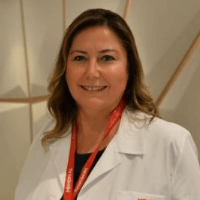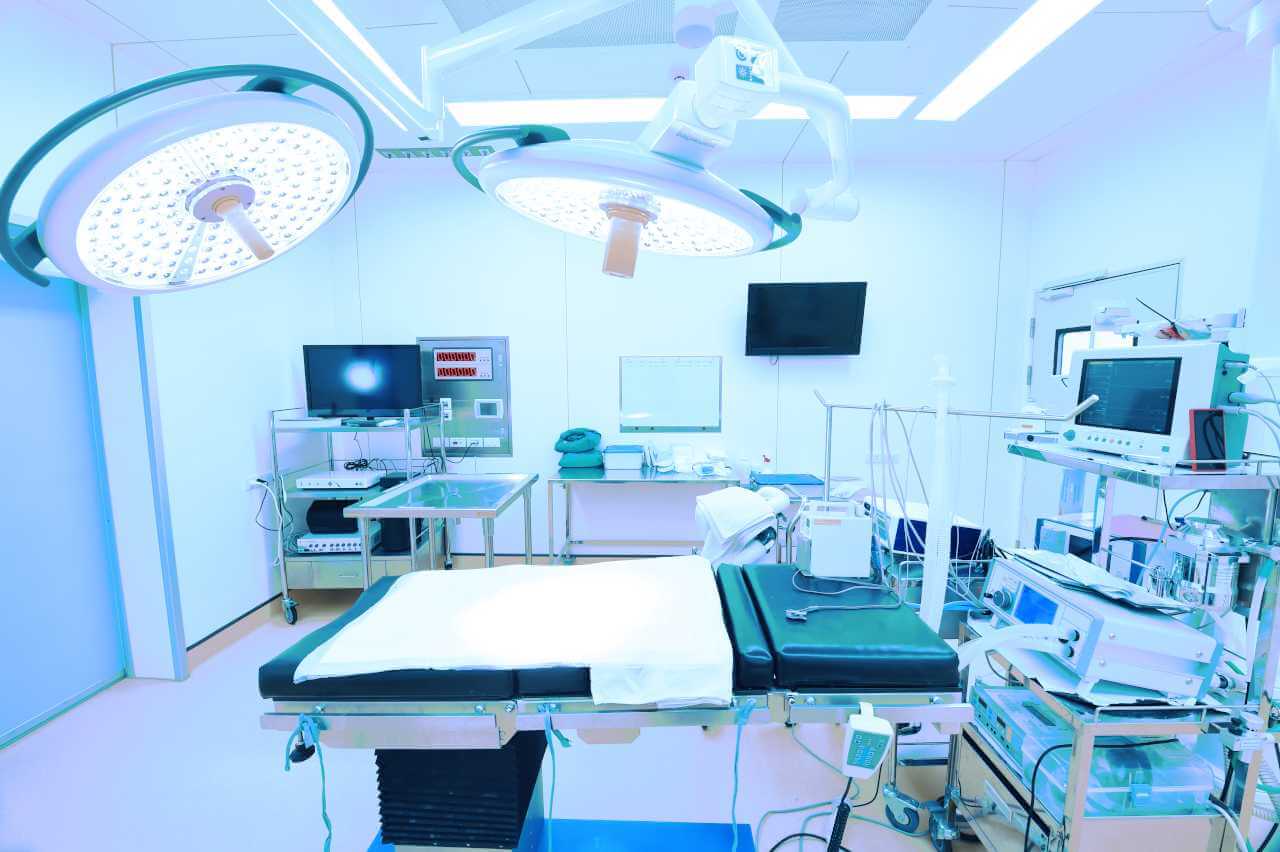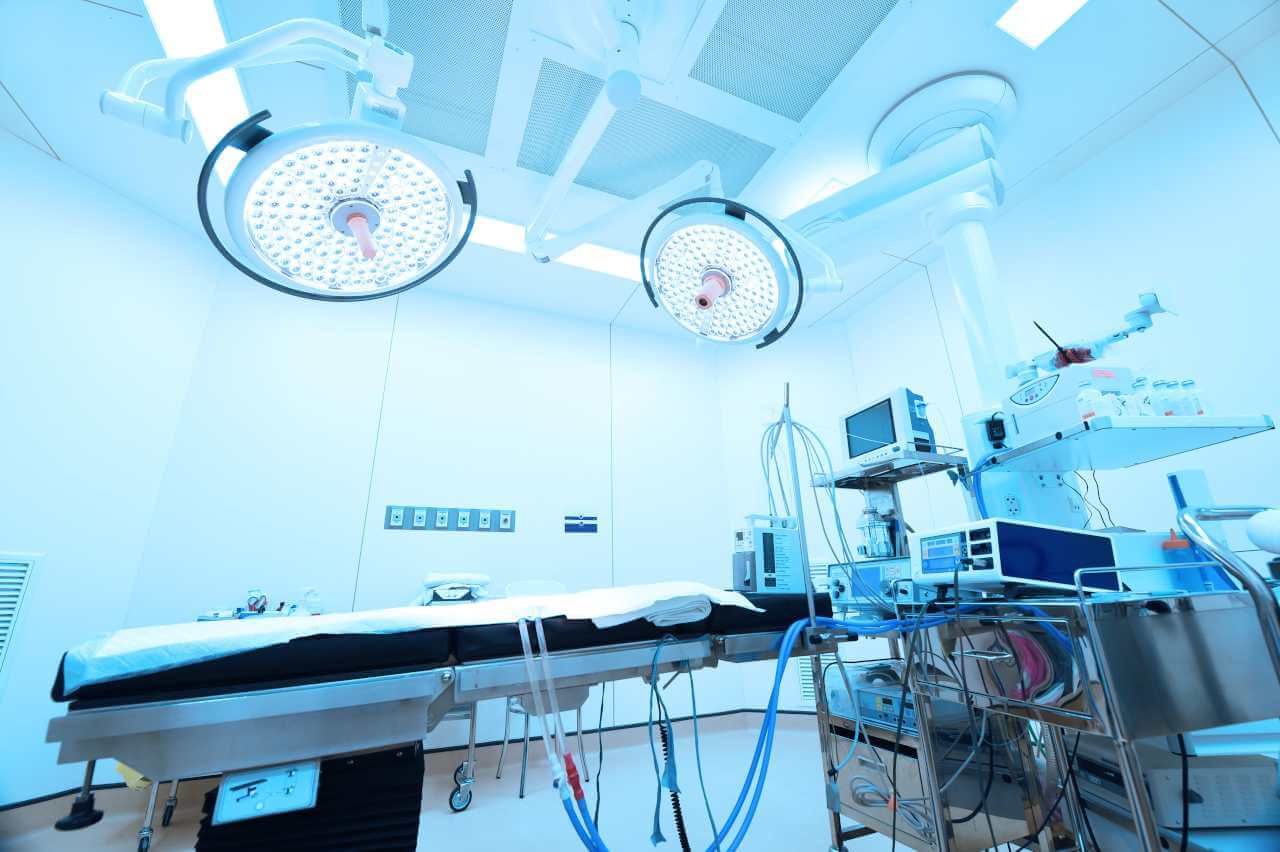
The program includes:
- Initial presentation in the clinic
- clinical history taking
- review of medical records
- physical examination
- laboratory tests:
- complete blood count
- general urine analysis
- biochemical analysis of blood
- TSH-basal, fT3, fT4
- tumor markers (AFP, CEA, СА-19-9)
- indicators of inflammation (CRP, ESR)
- indicators of blood coagulation
- CT planning of radiation therapy
- full course of radiation therapy
- individual plan of the chemotherapy, the cost of medicines is included
- symptomatic treatment
- cost of essential medicines and materials
- nursing services
- control examinations
- consultations of related specialists
How program is carried out
During the first visit, the doctor will conduct a clinical examination and go through the results of previous laboratory tests and instrumental examinations. After that, you will undergo an additional examination, including complete blood count, laboratory assessment of liver and kidney function. Based on the received results, the physician will elaborate the chemotherapy regimen, conduct radiotherapy planning with the help of CT or MRI, make the permanent tattoo marks on the skin and conduct CT simulation in order to assess the accuracy of the rays and the radiation dose. If necessary, related medical specialists will be involved in the elaboration of a treatment regimen (tumor board).
Chemotherapy and radiation therapy are carried out as the day hospital procedure, without mandatory admission to the hospital. At each visit, the physician will assess your general condition and the marks on the skin. After that, you will be placed in a shielded radiation therapy room, on a special table.
Each radiation therapy session lasts less than half an hour (including preparation). All this time, doctors and nurses are monitoring your condition, you can communicate with them through a loudspeaker. The procedure is completely painless. Depending on the planned course of treatment, you will visit the hospital from 1 to 3-5 times a week.
During the chemotherapy session, after the placement of a venous catheter, you will stay in a comfortable ward. An infusion system will be connected to the catheter, through which the required drug or a drug combination will be administered. All drugs are administered by intravenous drip, slowly, so the total duration of the infusion can be up to several hours. All this time, doctors and nurses will monitor your health condition closely.
After the completion of the chemotherapy and radiation therapy course, you will undergo control examinations aimed at assessing your condition and efficacy of treatment. After that you will receive the medical report with detailed recommendations regarding further follow-up and treatment. In the future, you will be able to have a distant consultation with your attending physician and schedule the next course of treatment, if necessary.
Required documents
- Medical records
- MRI/CT scan (not older than 3 months)
- Biopsy results (if available)
Service
You may also book:
 BookingHealth Price from:
BookingHealth Price from:
About the department
The Department of Oncology and Radiation Oncology at the Memorial Bahсelievler Hospital Istanbul offers the full range of medical services for prevention, diagnostics, treatment and follow-up monitoring of cancer patients. The doctors of the clinical practice mostly use such treatment methods as surgical resection (if possible, laparoscopic and robot-assisted), various chemotherapy and radiation therapy regimens. The specialists also successfully apply hormonal therapy, immunotherapy, antibody therapy, targeted therapy and other innovative techniques. The advanced medical and technical base of the department allows the doctors to detect malignant processes in the human body at any stage, as well as effectively treat cancer, achieving a complete cure or long-term remission. The Chief Physician of the department is Prof. Dr. med. Fazilet Oner Dincbas.
Since cancer treatment is a complex process and requires a highly professional approach, the specialists from various medical fields work hand in hand in the department, including oncologists, general surgeons, chemotherapists, radiation therapists, gynecologists, urologists, gastroenterologists, neurosurgeons, orthopedists, etc. The specialists regularly meet at interdisciplinary tumor boards, during which they jointly develop an individual treatment regimen for each patient. In the process of developing treatment tactics, the type of tumor, its localization, the stage of oncopathology, the general condition of the patient, his age and many other factors are taken into account.
In most cases, the first line therapy is surgical resection of the tumor. With appropriate indications, doctors perform laparoscopic interventions that can significantly speed up the patient's postoperative recovery. Such operations minimize the risks of postoperative complications and infection, exclude intense bleeding and severe pain syndrome. As a rule, to achieve a satisfactory therapeutic result, surgery alone is not enough. In most cases, before or after surgery (depending on the specific clinical situation), the department's patients undergo chemotherapy and/or radiation therapy. The essence of chemotherapy is the use of tablets or intravenous infusions to kill cancer cells in the human body. Radiation therapy acts on the tumor locally using ionizing radiation. The advantage of this type of therapy is that only the tissues affected by the oncological process are exposed to radiation, without harm to healthy organs. The department has state-of-the-art equipment for radiation therapy, for example, Elekta Versa Signature HD, which allows high doses of ionizing radiation to be focused on tumors with maximum accuracy.
Once a cancer diagnosis is established, many patients experience negative emotions that negatively affect treatment outcomes. In this regard, the doctors of the department devote a sufficient amount of time to counseling patients, show empathy. If necessary, competent psychologists work with patients who instill belief in a favorable treatment outcome, which plays a very important role in overcoming cancer.
The department's range of medical services includes:
- Diagnostics and treatment of cancer of the gastrointestinal tract (stomach, colorectal, esophageal tumors)
- Diagnostics and treatment of liver, pancreatic, gallbladder and bile duct cancer
- Diagnostics and treatment of endocrine cancer (thyroid, parathyroid, adrenal tumors)
- Diagnostics and treatment of cancer of the respiratory system (lung, pleural, chest wall tumors)
- Diagnostics and treatment of cancer of the female reproductive system (uterine, cervical, ovarian, fallopian tube, vaginal, vulvar tumors)
- Diagnostics and treatment of breast cancer in women, including oncoplastic interventions to restore breast aesthetics after total mastectomy
- Diagnostics and treatment of cancer of the male reproductive system (prostate, testicular, penile tumors)
- Diagnostics and treatment of cancer of the urinary system (kidney and bladder tumors)
- Diagnostics and treatment of brain cancer (skull base, pituitary tumors)
- Diagnostics and treatment of head and neck cancer (laryngeal, pharyngeal, paranasal sinus and nasal tumors, tumors of the tonsils and salivary glands)
- Diagnostics and treatment of cancer of the musculoskeletal system (bone and soft tissue tumors, including bone metastases in cancers of other localizations)
- Diagnostics and treatment of other types of cancer
Curriculum vitae
Professional Career
- Since 2018 Work in the Department of Oncology and Radiation Oncology at the Memorial Bahсelievler Hospital Istanbul.
- 2015 - 2018 Specialist in Radiation Oncology at the Memorial Şişli Hospital Istanbul.
- Since 1986 Specialist in Radiation Oncology, Istanbul University Hospital.
Higher Education and Postgraduate Training
- 2005 Professorship, Cerrahpaşa Faculty of Medicine, Istanbul University.
- 1997 - 2005 Assistant Professorship, Cerrahpaşa Faculty of Medicine, Istanbul University.
- 1986 - 1991 Specialized training in Radiation Oncology, Cerrahpaşa Faculty of Medicine, Istanbul University.
- 1980 - 1986 Study of Human Medicine at the Faculty of Medicine, Ankara University.
Advanced Training Courses
- 2002 Clinical Radiation Physics Course of the European Society for Radiotherapy and Oncology (ESTRO), Izmir, Turkey.
- 1997 Radiobiology Course of the European Society for Radiotherapy and Oncology (ESTRO), Como, Italy.
- 1998 Molecular Biology Course of the European Society for Radiotherapy and Oncology (ESTRO), Dublin, Ireland.
- 1997 Modern Brachytherapy Course of the European Society for Radiotherapy and Oncology (ESTRO), Bratislava, Slovakia.
- 1993 Radiation Oncology Course, National Cancer Institute, Heidelberg University, Heidelberg, Germany.
- 1993 Radiation Therapy Course, University of Giessen, Giessen, Germany.
Memberships in Professional Societies
- Turkish Society for Radiation Oncology (TROD).
- Turkish Lung Cancer Society (TAKD).
- Turkish Association of Urooncology.
- Turkish Oncology Group (TOG).
- Lung Cancer Research Foundation (AKAD).
- American Society for Radiation Oncology (ASTRO).
- European Society for Radiotherapy and Oncology (ESTRO).
- International Association for the Study of Lung Cancer (IASLC).
Photo of the doctor: (c) Memorial Bahçelievler Hospital
About hospital
The Memorial Bahçelievler Hospital Istanbul is an advanced multidisciplinary medical center that began its clinical practice in 2018. It is part of the world famous Memorial Healthcare Group. The hospital was designed in accordance with the very latest standards of modern architecture with the aim of providing top-class medical services in a pleasant and patient-oriented environment. It is worth noting that the interior of the medical facility is full of live plants, which have a positive impact on people and their mood. The hospital is awarded the prestigious LEED Platinum Certificate, confirming the highest level of environmental friendliness and safety of the buildings of the medical complex.
The hospital has 320 beds for patient hospitalization. The medical and technical base of the hospital is one of the best and most advanced in Turkey – modern diagnostic rooms with MRI, CT, PET-CT scanners, gamma cameras, X-ray equipment, mammography systems and other equipment, 15 operating rooms, including for robot-assisted, endoscopic and hybrid surgical interventions, intensive care units, etc. The hospital also has a high-performance state-of-the-art Elekta Versa HD SIGNATURE system for radiation therapy.
The powerful technical resources of the hospital are complemented by a highly professional medical staff, who have achieved significant success not only at the national level, but also in the international medical arena. The doctors and nursing staff of the hospital are distinguished by excellent medical qualifications, as well as humane and compassionate attitude towards each patient. They strongly support their patients on their way to recovery.
The medical center admits not only Turkish citizens for treatment, but also patients from 92 countries of the world, and therefore it boasts a wealth of experience in serving international patients with clinical cases of varying complexity.
Photo: (c) Memorial Bahçelievler Hospital, (c) depositphotos
Accommodation in hospital
Patients rooms
The patients of the Memorial Bahçelievler Hospital Istanbul live in cozy rooms with an excellent layout and modern design. The standard patient rooms are equipped with a comfortable automatically adjustable bed, a bedside table, a table and a chair, a wardrobe, a sofa for receiving visitors. The patient room also includes a TV, a telephone and Wi-Fi. Each room has an ensuite bathroom with shower and toilet. The hospital also provides patients with enhanced-comfort rooms corresponding to a five-star hotel.
Meals and Menus
The patient and the accompanying person are offered tasty and balanced three meals a day. If for some reason you do not eat all foods, you will be offered an individual menu. Please inform the medical staff about your food preferences prior to treatment.
Further details
Standard rooms include:
Accompanying person
During the inpatient program, the accompanying person can live with the patient in a patient room or a hotel of his choice. Our managers will help you choose the most suitable option.
Hotel
During an outpatient program, the patient can stay at the hotel of his choice. Our managers will help you choose the most suitable option.




